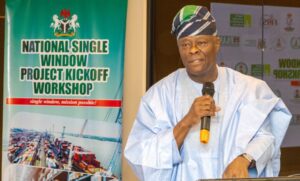The Federal Government has officially launched the National Single Window (NSW) Project, a transformative initiative aimed at enhancing Nigeria’s trade and economic growth by streamlining trade processes, reducing bottlenecks, and increasing transparency.
The launch was spearheaded by the Minister of Finance and Coordinating Minister of the Economy, Mr. Wale Edun, who emphasized the project’s importance in positioning Nigeria for economic advancement.
During the kickoff workshop held in Abuja, Edun stated, “This initiative is a crucial step towards improving our trade facilitation processes and making Nigeria more competitive in the global market.”

The NSW project, led by the Federal Inland Revenue Service (FIRS) and the Nigerian Sovereign Investment Authority (NSIA), seeks to establish a centralized platform where traders can submit and receive information related to import and export procedures.
This initiative is expected to significantly reduce the time and cost associated with trade transactions, thereby fostering a more conducive business environment and attracting foreign investment.
A statement from the Ministry of Finance, signed by Mohammed Manga, Director of Information and Public Relations, highlighted that the project aligns with President Bola Ahmed Tinubu’s broader economic reform agenda.
By simplifying trade procedures and minimizing bureaucratic hurdles, the government aims to create a more business-friendly environment that will drive sustainable economic growth.
The project secretariat, located within the FIRS, will serve as the central hub for coordination and oversight. Key stakeholders from various government agencies, including the Nigerian Ports Authority, Nigerian Customs Service, Nigerian Civil Aviation Authority, and National Agency for Food and Drug Administration and Control, are actively involved in the workshop to ensure the successful implementation of the NSW.
The three-day workshop will conclude with a detailed action plan outlining the next steps for the project and the timelines for its full implementation.
As the NSW project progresses, Nigeria can anticipate improved trade efficiency, increased transparency, and a more business-friendly environment, paving the way for sustained economic growth and development.




